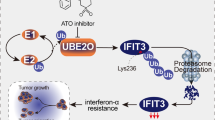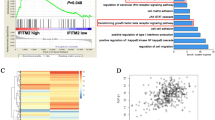Abstract
Human interferon-induced transmembrane protein family (IFITMs) consists of five main proteins. IFITM1, IFITM2, and IFITM3 can be induced by interferon, while IFITM5 and IFITM10 are insensitive to interferon. IFITMs has various functions, including well-researched antiviral effects. As a molecule whose expression is significantly increased by interferon in the immune microenvironment, IFITMs has drawn growing interest in recent years for their role in the cancer progression. Unlike antiviral effects, the role and mechanism of IFITMs in cancer progression have not been clearly studied, especially the role and molecular mechanism of IFITMs in pancreatic cancer are rarely reported in the literature. This article focuses on the role and potential mechanism of IFITMs in pancreatic cancer progression by analyzing the function and mechanism of IFITM1-3 in other cancers and conducting bioinformatics analysis using the databases, so as to provide a new target for pancreatic cancer therapy.





Similar content being viewed by others

Data availability
All data of this article can be found from UCSC Xena (https://xenabrowser.net/), TCGA database (https://tcga-data.nci.nih.gov/tcga/), and GTEx databases (http://commonfund.nih.gov/GTEx/). The unpaired t test and one-way ANOVA were used to analyze the expression levels of IFITMs in tumor and normal tissues and the relationship with pathologic characteristics by GraphPad Prism 9.5 or R packages ggplot2 and ggpubr. The survival probability was determined using Kaplan–Meier survival curves by log-rank test and cox regression analysis by R packages survival and survminer. The CIBERSORT deconvolution algorithm was introduced to analyze the relative abundance of infiltrating immune cells from the gene expression data of PAAD in TCGA datasets by R package CIBERSORT. All statistical tests were two-sided. The p < 0.05 was considered statistically significant. Figures 2, 3, and 5 are plotted by online software Biorender (https://app.biorender.com).
References
Zhang Z, et al. Evolutionary dynamics of the interferon-induced transmembrane gene family in vertebrates. PLoS ONE. 2012;7: e49265.
Weston S, et al. A membrane topology model for human interferon inducible transmembrane protein 1. PLoS ONE. 2014;9: e104341.
Li C, et al. Antiviral role of IFITM proteins in classical swine fever virus Infection. Viruses. 2019;11:126–8.
Lewin AR, et al. Molecular analysis of a human interferon-inducible gene family. Eur J Biochem. 1991;199:417–23.
Siegrist F, et al. The small interferon-induced transmembrane genes and proteins. J Interferon Cytokine Res. 2011;31:183–97.
John SP, et al. The CD225 domain of IFITM3 is required for both IFITM protein association and inhibition of influenza A virus and dengue virus replication. J Virol. 2013;87:7837–52.
Chan YK, et al. IFITM proteins restrict antibody-dependent enhancement of dengue virus infection. PLoS ONE. 2012;7: e34508.
Feeley EM, et al. IFITM3 inhibits influenza A virus infection by preventing cytosolic entry. PLoS Pathog. 2011;7: e1002337.
Lu J, et al. The IFITM proteins inhibit HIV-1 infection. J Virol. 2011;85:2126–37.
Bozzo CP, et al. IFITM proteins promote SARS-CoV-2 infection and are targets for virus inhibition in vitro. Nat Commun. 2021;12:4584.
Gomez-Herranz M, et al. IFITM proteins: Understanding their diverse roles in viral infection, cancer, and immunity. J Biol Chem. 2023;299: 102741.
Liu X, et al. IFITM3 promotes bone metastasis of prostate cancer cells by mediating activation of the TGF-beta signaling pathway. Cell Death Dis. 2019;10:517.
Xu L, et al. IGF1/IGF1R/STAT3 signaling-inducible IFITM2 promotes gastric cancer growth and metastasis. Cancer Lett. 2017;393:76–85.
Hu J, et al. Mechanism and biological significance of the overexpression of IFITM3 in gastric cancer. Oncol Rep. 2014;32:2648–56.
Yu F, et al. IFITM1 promotes the metastasis of human colorectal cancer via CAV-1. Cancer Lett. 2015;368:135–43.
Yang J, et al. Combination of IFITM1 knockdown and radiotherapy inhibits the growth of oral cancer. Cancer Sci. 2018;109:3115–28.
Tirosh B, et al. “1-8 interferon inducible gene family”: putative colon carcinoma-associated antigens. Br J Cancer. 2007;97:1655–63.
Daniel-Carmi V, et al. The human 1–8D gene (IFITM2) is a novel p53 independent pro-apoptotic gene. Int J Cancer. 2009;125:2810–9.
Andreu P, et al. Identification of the IFITM family as a new molecular marker in human colorectal tumors. Cancer Res. 2006;66:1949–55.
Yang N, et al. Predicative value of IFITM2 in renal clear cell carcinoma: IFITM2 is associated with lymphatic metastasis and poor clinical outcome. Biochem Biophys Res Commun. 2021;534:157–64.
Cai Y, et al. Interferon-induced transmembrane protein 3 shapes an inflamed tumor microenvironment and identifies immuno-hot tumors. Front Immunol. 2021;12: 704965.
Cui Y, et al. Downregulation of caveolin-1 increased EGFR-TKIs sensitivity in lung adenocarcinoma cell line with EGFR mutation. Biochem Biophys Res Commun. 2018;495:733–9.
Koh YW, et al. Prognostic significance of IFITM1 expression and correlation with microvessel density and epithelial-mesenchymal transition signature in lung adenocarcinoma. Pathol Res Pract. 2019;215: 152444.
Sakamoto S, et al. Interferon-induced transmembrane protein 1 (IFITM1) promotes distant metastasis of small cell lung cancer. Int J Mol Sci. 2020;21(14):4934.
Lui AJ, et al. IFITM1 suppression blocks proliferation and invasion of aromatase inhibitor-resistant breast cancer in vivo by JAK/STAT-mediated induction of p21. Cancer Lett. 2017;399:29–43.
Yang M, et al. Knockdown of interferon-induced transmembrane protein 3 expression suppresses breast cancer cell growth and colony formation and affects the cell cycle. Oncol Rep. 2013;30:171–8.
Hou Y, et al. Interferon-induced transmembrane protein 3 expression upregulation is involved in progression of hepatocellular carcinoma. Biomed Res Int. 2021;2021:5612138.
Seyfried NT, et al. Up-regulation of NG2 proteoglycan and interferon-induced transmembrane proteins 1 and 3 in mouse astrocytoma: a membrane proteomics approach. Cancer Lett. 2008;263:243–52.
Zhao B, et al. The role of IFITM3 in the growth and migration of human glioma cells. BMC Neurol. 2013;13:210.
Mizoshiri N, et al. The tetraspanin CD81 mediates the growth and metastases of human osteosarcoma. Cell Oncol (Dordr). 2019;42:861–71.
Liu Y, et al. High IFITM3 expression predicts adverse prognosis in acute myeloid leukemia. Cancer Gene Ther. 2020;27:38–44.
Liang Y, et al. Malignant clonal evolution drives multiple myeloma cellular ecological diversity and microenvironment reprogramming. Mol Cancer. 2022;21:182.
Akyerli CB, et al. Expression of IFITM1 in chronic myeloid leukemia patients. Leuk Res. 2005;29:283–6.
Carmelle R, et al. Differentiating pancreatic lesions by microarray and QPCR analysis of pancreatic juice RNAs. Cancer Biol Ther. 2006;5:1383–9.
Wu L, et al. Identification of IFN-induced transmembrane protein 1 with prognostic value in pancreatic cancer using network module-based analysis. Front Oncol. 2021;11: 626883.
Lei Z, et al. Knockdown of interferon-induced transmembrane protein 1 inhibited proliferation, induced cell cycle arrest and apoptosis, and suppressed MAPK signaling pathway in pancreatic cancer cells. Biosci Biotechnol Biochem. 2020;84:1603–13.
Yang G, et al. IFITM1 plays an essential role in the antiproliferative action of interferon-gamma. Oncogene. 2007;26:594–603.
Zhang Y, et al. Increased expression of CD81 is associated with poor prognosis of prostate cancer and increases the progression of prostate cancer cells in vitro. Exp Ther Med. 2020;19:755–61.
Gan CP, et al. IFITM3 knockdown reduces the expression of CCND1 and CDK4 and suppresses the growth of oral squamous cell carcinoma cells. Cell Oncol (Dordr). 2019;42:477–90.
Liu Y, et al. Interferon-induced transmembrane protein 2 promotes epithelial–mesenchymal transition by activating transforming growth factor-beta1/small mother against decapentaplegic 2 signaling in gastric cancer. Mol Biol Rep. 2022;49:997–1006.
Sigismund S, et al. Emerging functions of the EGFR in cancer. Mol Oncol. 2018;12:3–20.
Li Q, et al. RUNX1 promotes tumour metastasis by activating the Wnt/beta-catenin signalling pathway and EMT in colorectal cancer. J Exp Clin Cancer Res. 2019;38:334.
Hatano H, et al. IFN-induced transmembrane protein 1 promotes invasion at early stage of head and neck cancer progression. Clin Cancer Res. 2008;14:6097–105.
He JD, et al. Influences of the interferon induced transmembrane protein 1 on the proliferation, invasion, and metastasis of the colorectal cancer SW480 cell lines. Chin Med J (Engl). 2012;125:517–22.
Tolomeo M, et al. The multifaced role of STAT3 in cancer and its implication for anticancer therapy. Int J Mol Sci. 2021;22:603.
Weichselbaum RR, et al. An interferon-related gene signature for DNA damage resistance is a predictive marker for chemotherapy and radiation for breast cancer. Proc Natl Acad Sci U S A. 2008;105:18490–5.
Khodarev NN, et al. STAT1 is overexpressed in tumors selected for radioresistance and confers protection from radiation in transduced sensitive cells. Proc Natl Acad Sci U S A. 2004;101:1714–9.
Le TV, et al. Increased expression of p27 is associated with the cisplatin resistance in gastric cancer cell line YCC-3. Arch Pharm Res. 2010;33:1127–32.
Goad DW, et al. Acquired chemoresistance can lead to increased resistance of pancreatic cancer cells to oncolytic vesicular stomatitis virus. Mol Ther Oncolytics. 2022;24:59–76.
Choi HJ, et al. Targeting interferon response genes sensitizes aromatase inhibitor resistant breast cancer cells to estrogen-induced cell death. Breast Cancer Res. 2015;17:6.
Salas S, et al. Molecular characterization of the response to chemotherapy in conventional osteosarcomas: predictive value of HSD17B10 and IFITM2. Int J Cancer. 2009;125:851–60.
Li H, et al. Expression and prognostic value of IFITM1 and IFITM3 in head and neck squamous cell carcinoma. Am J Clin Pathol. 2020;153:618–29.
Chan RH, et al. The expression quantitative trait loci in immune response genes impact the characteristics and survival of colorectal cancer. Diagnostics (Basel). 2022;12:315.
Peters BA, et al. The lung microbiome, peripheral gene expression, and recurrence-free survival after resection of stage II non-small cell lung cancer. Genome Med. 2022;14:121.
Ning F, et al. Hes1 attenuates type I IFN responses via VEGF-C and WDFY1. J Exp Med. 2019;216:1396–410.
Popson SA, et al. Interferon-induced transmembrane protein 1 regulates endothelial lumen formation during angiogenesis. Arterioscler Thromb Vasc Biol. 2014;34:1011–9.
Murphy K, et al. Janeway’s immunobiology. 8th ed. New York: Garland Science; 2011. p. 685–7.
Gomez-Herranz M, et al. The effects of IFITM1 and IFITM3 gene deletion on IFNgamma stimulated protein synthesis. Cell Signal. 2019;60:39–56.
Thibaut R, et al. Bystander IFN-gamma activity promotes widespread and sustained cytokine signaling altering the tumor microenvironment. Nat Cancer. 2020;1:302–14.
Yang Y, et al. The interferon-inducible 9–27 gene modulates the susceptibility to natural killer cells and the invasiveness of gastric cancer cells. Cancer Lett. 2005;221:191–200.
Vences-Catalan F, et al. Tetraspanin CD81 promotes tumor growth and metastasis by modulating the functions of T regulatory and myeloid-derived suppressor cells. Cancer Res. 2015;75:4517–26.
Shen C, et al. Identification of differentially expressed transcripts targeted by the knockdown of endogenous IFITM3. Mol Med Rep. 2016;14:4367–73.
Zhang R, et al. Role of the complement system in the tumor microenvironment. Cancer Cell Int. 2019;19:300.
Rosati A, et al. BAG3 promotes pancreatic ductal adenocarcinoma growth by activating stromal macrophages. Nat Commun. 2015;6:8695.
Yanez DC, et al. IFITM proteins drive type 2 T helper cell differentiation and exacerbate allergic airway inflammation. Eur J Immunol. 2019;49:66–78.
Lee J, et al. IFITM3 functions as a PIP3 scaffold to amplify PI3K signalling in B cells. Nature. 2020;588:491–7.
Hanahan D, et al. Hallmarks of cancer: the next generation. Cell. 2011;144:646–74.
Rouse BT, et al. Immunity and immunopathology to viruses: what decides the outcome? Nat Rev Immunol. 2010;10:514–26.
Baumgartner CK, et al. The PTPN2/PTPN1 inhibitor ABBV-CLS-484 unleashes potent anti-tumour immunity. Nature. 2023;622:850–62.
Acknowledgements
Not applicable.
Funding
This work was funded by Sichuan University Dedicated Postdoctoral Research and Development Fund Project (2022SCU12030).
Author information
Authors and Affiliations
Contributions
Peipei Wang participated in the Conceptualization, funding acquisition, methodology, resources, software, investigation, formal analysis, and writing of the original draft; Yan Pan participated in the Data curation and writing of the original draft; Yu Zhang participated in the Software, visualization, and investigation; Congliang Chen participated in the Software, resources, and validation; Junmei Hu participated in the Resources and writing, reviewing, and editing of the manuscript; Xia Wang (Corresponding Author) participated in the Conceptualization, resources, supervision, and writing, reviewing, and editing of the manuscript.
Corresponding author
Ethics declarations
Conflict of interest
The authors declare that they have no competing interests.
Additional information
Publisher's Note
Springer Nature remains neutral with regard to jurisdictional claims in published maps and institutional affiliations.
Supplementary Information
Below is the link to the electronic supplementary material.
Rights and permissions
Springer Nature or its licensor (e.g. a society or other partner) holds exclusive rights to this article under a publishing agreement with the author(s) or other rightsholder(s); author self-archiving of the accepted manuscript version of this article is solely governed by the terms of such publishing agreement and applicable law.
About this article
Cite this article
Wang, P., Pan, Y., Zhang, Y. et al. Role of interferon-induced transmembrane protein family in cancer progression: a special focus on pancreatic cancer. Med Oncol 41, 85 (2024). https://doi.org/10.1007/s12032-024-02308-6
Received:
Accepted:
Published:
DOI: https://doi.org/10.1007/s12032-024-02308-6



